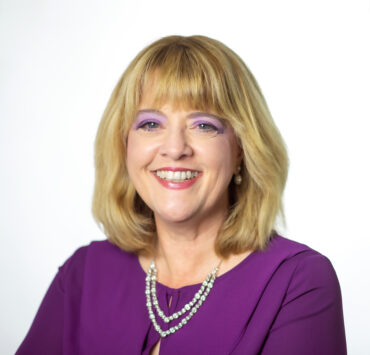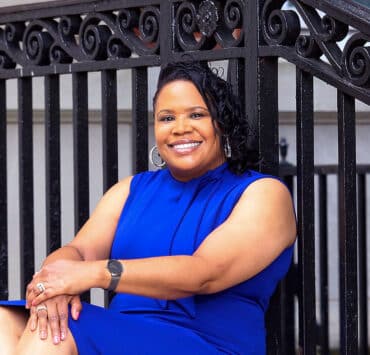Lynn Gordon may not lay down the law. But with more than two decades of legal and compliance experience under her belt, she is adept in helping healthcare organizations understand and follow it.
“I was ready for the complexity and hyperregulation of the industry that often skews and detracts from the core mission and focus of healthcare providers,” the veteran attorney says.
After the former chief legal officer of New Hanover Regional Medical Center and Health System helped negotiate its nearly $2 billion sale to Novant Health, Gordon knew it was time to seek new opportunities. “I essentially worked my way out of a job that I loved because transitioning away from a county-owned healthcare system model—restricted in both geographic growth and innovative change—was what the community and my organization needed to be able to truly serve southeastern North Carolina,” she explains.
When Alo Solutions reached out about its head of legal and compliance position, she welcomed the opportunity to join its leadership. “We’re all seasoned executives from different environments, but together we’re a think tank,” Gordon says.
Moving from a larger health system, Gordon left behind some of the red tape. Larger systems are layered and entail levels of bureaucracy; however, her nimble team at Alo is able to “think outside of the box” simply because that is one of its primary charges.
Its timing could not be better for North Carolina and the southeastern US, where a value-based care (VBC) delivery model is still evolving. Under VBC, physicians and other providers will be compensated for and better able to focus on keeping communities healthy. “Our healthcare spend is enormous, but our results do not align,” she says. “This is a time for innovation, input and close attention from the front lines.”
Lynn Gordon evaluates the consequences of laws and regulations, builds relationships with both regulators and community leaders, and helps explore alternative models as legal and compliance requirements change. “We are going to be trial and error, with some initiatives,” she says. But this is how innovation occurs.
“Avance’s practice model doesn’t have that health system nexus or affiliation. We’re agnostic in that our physicians can then really focus on what’s best for the patient.”
Lynn Gordon
Alo’s first endeavor—acquiring and bolstering Avance Care and its unique model of supporting physicians across twenty-five clinics—is focused on expanding practice options as healthcare delivery continues to transition to VBC delivery. Alo is also investing in capabilities and new services.
“Keeping up with professional and leadership development in the ever-evolving healthcare industry is a challenge for physicians whose primary desire and focus is to care for patients,” says Marcie Rohleder, senior director of healthcare at Huron Consulting Group. “We collaborate with Alo Solutions to provide independent clinicians with evidence-based leadership practices that will help them build their skills and guide their teams into the future. When training is more effective and efficient, it creates a better environment and experience for providers and ultimately patients.”
Independent physicians face an uphill battle. According to the American Medical Association, fewer than half of patient care physicians work for independent practices.
The kicker? Hospitals and health systems are buying them out. Whether they hire independent physicians away from or purchase their practices outright, the landscape for medical practitioners is uneven.
While ideal for some, not every physician wants to work for a hospital or health system. But different practice models can coexist. When Avance Care was founded in 2008, it provided management tools to independent physicians who ran their practices, and it grew into a thriving hybrid model of independent practices.
“Avance’s practice model doesn’t have that health system nexus or affiliation,” Gordon says. “We’re agnostic in that our physicians can then really focus on what’s best for the patient.”
Lynn Gordon champions the patient-provider relationship as if she were a part of it. She collaborates with doctors to gauge health trends in local communities and support VBC delivery. “Part of what we are looking at are social determinants of health [SDOH]: how do we assess needs, manage outcomes, and bolster equity so that wellness becomes more the norm across diverse communities?” she elaborates.
As defined by the American Medical Association, SDOH are “the underlying community-wide social, economic, and physical conditions in which people are born, grow, live, work and age . . . not experienced equally by people and are often inextricably linked to each other.” This is especially important due to the growing number of Medicare and Medicaid beneficiaries who often present with needs that, while not directly medical, have a significant impact on health and wellbeing.
Gordon references the NC Healthy Opportunities Pilot, as an example of pulling SDOH into establishing individualized care plans. Recently, her organization began more focused nutrition screening for its Medicare chronic care management patients and identified notable food scarcity, which will inform continued program development within Avance Care.
“You have to be a lifelong learner because this is the most fluid and evolving area of law. . . . It’s fascinating, it’s wonderful, it’s complex. But if that doesn’t appeal to you, it’s not the area of law for you.”
Lynn Gordon
Before Lynn Gordon entered the corporate world, she spent twenty years as a healthcare attorney representing a wide range of providers. In 2012, she advised the Cook County Health and Hospitals System (CCHHS) in Chicago when it developed CountyCare, a no-cost Medicaid health plan that currently serves over 380,000 members. She, then, represented CCHHS in restructuring the waiver network into the requisite managed care community network in 2014. Cook County is the second most populous county in the nation, with more than five million residents, and CCHHS is one of the largest and most comprehensive public health and hospital systems in the country.
Because Alo is based in North Carolina, a state transitioning its Medicaid program from a fee-for-service model into a managed care system, Gordon leverages her expertise so her employer and providers can embrace the new economics at play. “We are now able to measure health data, run data analytics, and demonstrate we have made these positive changes,” she says. “It’s about documenting through data how we’re changing health . . . and that’s a tall order, especially with the Medicaid population.”
What motivates Lynn Gordon is the same thing she believes aspiring healthcare attorneys and compliance officers need to excel. “You have to be a lifelong learner because this is the most fluid and evolving area of law,” she says. “You will be following the industry daily. It’s fascinating, it’s wonderful, it’s complex. But if that doesn’t appeal to you, it’s not the area of law for you.”
Poyner Spruill values our working relationship with Lynn. She is one of the most dynamic, practical general counsel we’ve ever had the pleasure to work with. The breadth of Lynn’s knowledge in the healthcare space is so impressive, but more significant is her pragmatic approach to analyzing risk and identifying solutions. Alo Solutions is lucky to have Lynn!


